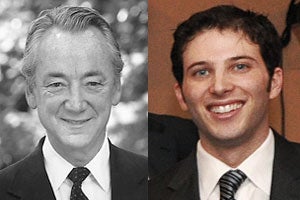
A Harvard Law School student appeared before the First Circuit Court of Appeals yesterday as the lead lawyer in an illegal downloading and sharing lawsuit brought against a Boston University student by the music recording industry. This is the first case of its kind to reach the federal appellate level.
In a motion approved by the First Circuit Court of Appeals last week, Jason Harrow ’11, a member of the defense team for Boston University graduate student Joel Tenenbaum, was cleared to make oral argument on Tenenbaum’s behalf.
As Tenenbaum’s defense attorneys, Harrow and Professor Charles R. Nesson ’63 faced-off against a team of lawyers representing the Recording Industry Association of America that includes former Solicitor General Paul Clement ’92.
Harrow argued that Congress never intended to punish individual consumers when passing a copyright bill more than a decade ago.
[See Boston Globe coverage of the trial]
Last November, Harrow was one of the winners of Harvard’s 100th Annual Ames Moot Court Competition, judged by Supreme Court Chief Justice John Roberts.
Of the stakes Harrow says, “It’s clear that the record industry sees the bigger issues present in this case, as they’ve hired one of the most famous and respected lawyers in the country to argue their side. It’s incredibly exciting to go up against him and tell the Court our story.”
Tenenbaum, who has been represented pro bono by Nesson throughout the highly publicized copyright dispute, was sued in 2007 for sharing 30 songs. A jury found him liable for $675,000, but the trial judge, U.S. District Judge Nancy Gertner, reduced the award to $67,500 after finding the original penalty to be “unconstitutionally excessive” and a violation of Tenenbaum’s right to due process.
Both parties appealed and on April 4th, Tenenbaum became the first target of the RIAA litigation campaign to make it to the appellate level.
Harrow explains that he felt compelled to act because “Joel could have been me or anyone else I knew. When I heard that someone just like me was being sued for hundreds of thousands dollars for just being an average college student, the unfairness was palpable.”
For related articles, see:
“Up on Downloading: HLS Professors Propose Solutions to Music Industry Crisis,” from the Summer 2004 issue of the Harvard Law Bulletin
“Judge Reduces Penalties in File-Sharing Case Defended by Nesson” (July 16, 2010)